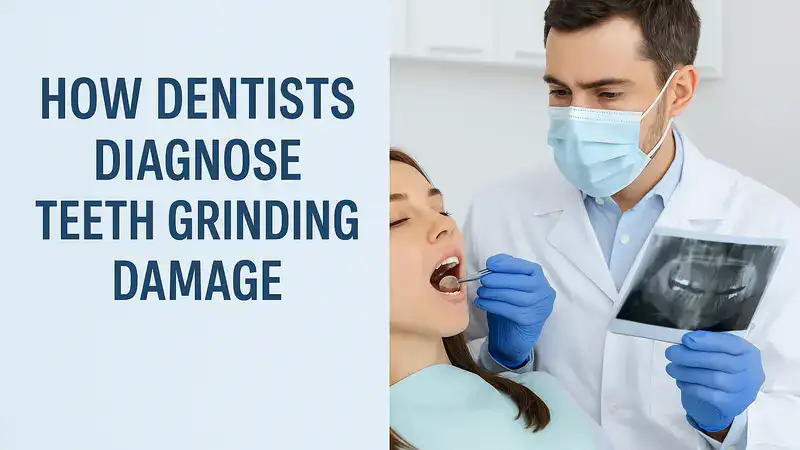Teeth grinding affects people of all ages, and no one knows it. Teeth grinding is a major problem for our tongue. Initially, this condition damages the enamel and jawbone and, if left untreated, can cause lifelong dental problems. If the treatment of this disease is started from the beginning, we can avoid more damage and bring back our first smile without suffering. Today, we will discuss this disease in detail in this article. Grinded teeth repair helps fix this damage before it worsens.
What Is Grinded Teeth Repair and Why It Matters
People who grind or clench their teeth can have their teeth damaged over time. This condition is called “bruxism”, and it often occurs during sleep. Constant grinding wears down the teeth, flattens their surface, and wears away the protective layer on top, the enamel. This problem not only affects the comfort of the teeth but also spoils their appearance. Fortunately, dentists use methods such as bonding, crowns, or veneers to correct this damage. At the same time, some preventive measures, such as night guards, are also recommended to prevent further damage and to ensure that the treatment effect lasts longer.
When Do You Need Grinded Teeth Repair?
Many people are unaware that they are grinding their teeth until obvious symptoms appear. Early signs include jaw pain, tooth sensitivity, and enamel erosion. If your jaw muscles feel tight when you wake up in the morning, this could be a sign of nighttime grinding. Over time, if the problem worsens, your teeth may become loose or even dislodged. Dentists can identify damage by examining the surface of your teeth for signs of wear and tear. If the structure of your teeth is affected or you experience pain, immediate treatment is essential….
Understanding the Causes of Teeth Grinding (Bruxism)
Bruxism can have many physical or mental causes. Stress is one of the major causes. Anxiety or sleep disorders can also aggravate the problem. Misaligned teeth increase the chances of grinding. Excessive consumption of caffeine or alcohol can increase bruxism at night. In children, this habit can appear during development. Knowing your personal reasons is helpful for treatment and prevention.
Short-Term Effects of Teeth Grinding
Teeth grinding leads to multiple short-term problems. These include headaches and jaw pain in the morning. Patients often feel tension in their facial muscles. Gums may swell, and teeth may feel unusually sensitive. Tiny cracks can form in the enamel. Once pain becomes persistent, dental evaluation is essential. Early grinded teeth repair tackles minor changes before they worsen.
Long-Term Consequences Without Grinded Teeth Repair
If left untreated, teeth grinding can affect the entire mouth. Over time, the enamel on the teeth wears away, exposing the nerves that can cause even minor biting. A cavity can develop in the teeth, weakening them from the inside. This process can lead to a major change in biting patterns and jaw pain. If the condition worsens, the teeth can even break. Not only is it painful, but it can also affect confidence. If treated early, it can be expensive, but it can prevent permanent damage.
How Dentists Diagnose Teeth Grinding Damage

Dentists check for obvious signs of wear on biting surfaces. X-rays help assess bone and tooth condition. They ask about sleep habits or stress levels. Some patients undergo overnight sleep studies. Dentists also examine your jaw alignment. A clinical exam determines enamel thickness. Based on this, they decide which grinded teeth repair approach works best for you.
Grinded Teeth Repair: Best Treatment Options in 2025
1. Dental Bonding
If your teeth are slightly chipped, bonding can be a great solution. It involves filling the chipped area with a special tooth-coloured resin that hardens with the help of light. This improves the shape of the tooth and covers the sensitive area. This procedure is quick and inexpensive. However, it may need to be repaired over time. Dentists usually recommend this when the grinding effect is not too severe. It is often the first and easiest step in treating teeth affected by grinding.
2. Dental Crowns
Moderate or severe damage often requires crowns. These cover the entire surface of a tooth. Crowns protect the tooth from more wear. They also improve strength and aesthetics. Ceramic or porcelain crowns work best for durability. Properly placed crowns withstand long-term grinding. Dentists recommend this after enamel is lost. It’s a key method used in grinded teeth repair.
3. Porcelain Veneers
Veneers solve cosmetic damage caused by grinding. Dentists apply thin shells to the front of your teeth. They look natural and improve aesthetics. Veneers don’t correct function but shield teeth cosmetically. They’re used in mild to moderate damage cases. Dentists select them for front teeth wear. Veneers play a supporting role in long-term grinded teeth repair solutions.
4. Night Guards (Occlusal Splints)
Night guards prevent future tooth damage. These custom devices are worn during sleep. They reduce clenching pressure on teeth. They’re made of soft or hard plastic. Most dentists recommend them after physical repairs. They are essential parts of ongoing care. Night guards don’t fix worn teeth but stop them from worsening. They’re vital following any grinded teeth repair treatments.
5. Orthodontic Correction
If the teeth are not straight, the problem of teeth grinding increases. Braces or aligners improve the bite pattern by straightening the teeth, which reduces friction on the jaw. When the teeth are aligned correctly, the incidence of grinding is also reduced. Orthodontic treatment corrects the underlying cause, not the symptoms. Although it is not a direct part of the repair, it certainly improves the results. Dentists also consider this aspect when planning the repair.
Cost of Repairing Grinded Teeth
Treatment costs vary by damage and method. Bonding ranges from 100 to 400 per tooth. Crowns cost 800–800–2,500 per tooth. Veneers can cost 900–2,500 each. Night guards may cost between 300 and 700. Orthodontic work could exceed $3,000. Insurance may not cover cosmetic repairs. Prevention is cost-effective in the long term. Grinded teeth repair saves future costs of complete reconstruction.
Grinded Teeth Repair Success Stories
Studies have shown that if dental restorations are done correctly, the success rate is over 90 per cent. Patients report less pain and improved chewing ability. A 2024 ADA report acknowledged the positive results of night guards and crowns. Clear improvements in enamel protection were observed. Long-term follow-ups have shown that the effect of the restoration lasts for many years. In most cases, the teeth remain stable for more than ten years. Timely treatment guarantees better results.
Data-Driven Statistics on Teeth Grinding
- Roughly 30–40% of adults grind their teeth (Mayo Clinic)
- 15% of children experience nighttime grinding (Cleveland Clinic)
- Chronic bruxism patients are three times more likely to develop TMJ
- Over 65% of grinding cases are related to stress or poor sleep
- One in four patients don’t realize they grind until symptoms worsen
Reliable data supports the importance of regular care and repair.
How to Prevent Further Damage After Repair
Adopt relaxation techniques to reduce daily stress. Meditation, walking, and getting enough sleep reduce the risk of teeth grinding. Be sure to wear a night guard as directed by your dentist. Get regular checkups to check the condition of your teeth. Avoid chewing hard things. Limit caffeine consumption after noon and avoid alcohol. It is important to follow your doctor’s instructions. Dental restoration is only successful when it is accompanied by prevention. Consistent care maintains good results and prevents future problems.
When to Visit a Dentist for Grinded Teeth Repair
Don’t wait for pain to become a regular occurrence. As soon as you notice tooth sensitivity or mild jaw pain, see your dentist right away. Early diagnosis can prevent major and complicated treatment. If your teeth feel even slightly loose, it’s time to take action. Most problems are easily fixed if caught early. Delaying treatment can damage nerves. It’s important to get checked at least once a year or as soon as symptoms appear.
Common Myths About Tooth Grinding
Many people think that teeth grinding is only a nighttime habit, but it is also common to clench your jaw during the day due to stress. Some parents believe that children will outgrow the habit on their own as they grow older, although in some cases dental treatment is necessary. Another misconception is that repairs are not permanent, although with proper care the results can last for years. Some people blame sugar, but the real causes are more complex. Getting the right information helps you make better decisions.
Expert Advice for Long-Term Results
Dentists emphasise not only repair but also treating the underlying cause. Don’t just focus on superficial treatments. Reduce stress, improve sleep, and take care of your teeth’s alignment. Even after repairs, it’s important to wear a night guard. Follow your check-up schedule regularly and pay attention to any symptoms immediately. Permanent improvement is possible with the joint attention of the doctor and the patient. Teeth grinding treatment is only successful when overall health and hygiene are taken seriously.
Final Thoughts on Grinded Teeth Repair
Many people grind their teeth without realising it, and the damage is only noticed when it’s too late. Fortunately, there are simple treatments available today that can restore comfort, protection, and beauty. Just take action in time—your smile and your confidence can be protected.


